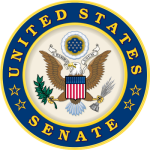- Industry: Government
- Number of terms: 4127
- Number of blossaries: 0
- Company Profile:
The United States Senate is the upper house of the United States Congress. The composition and powers of the Senate are established in Article One of the U.S. Constitution. Each U.S. state is represented by two senators, regardless of population. Senators serve staggered six-year terms.
Under the Constitution, the Senate (and House) is required to keep a Journal of its official proceedings, such as motions agreed to and votes taken. The Journal does not contain Senate debates. Senate rules stipulate that different Journals be kept for legislative and executive (treaties and nominations) proceedings, as well as for confidential legislative proceedings and proceedings when the Senate sits as a court for impeachment of high Federal officials.
Industry:Government
A process established in the Congressional Budget Act of 1974 by which Congress changes existing laws to conform tax and spending levels to the levels set in a budget resolution. Changes recommended by committees pursuant to a reconciliation instruction are incorporated into a reconciliation measure.
Industry:Government
A constitutionally recognized officer of the Senate who presides over the chamber in the absence of the Vice President. The President Pro Tempore (or, "president for a time") is elected by the Senate and is, by custom, the Senator of the majority party with the longest record of continuous service.
Industry:Government
Under the Constitution, the Vice President serves as President of the Senate. He may vote in the Senate in the case of a tie, but is not required to. The President Pro Tempore (and others designated by him) usually perform these duties during the Vice President's frequent absences from the Senate.
Industry:Government
The maximum amount, established in law, of public debt that can be outstanding. The limit covers virtually all debt incurred by the Federal Government (primarily the Treasury Department), including borrowing from trust funds, but excludes some debt incurred by agencies.
Industry:Government
Named after Senate Parliamentarian Emeritus Floyd M. Riddick, this Senate document contains the contemporary precedents and practices of the Senate. It is updated periodically by the Senate Parliamentarian.
Industry:Government
An amendment recommended by a committee in reporting a bill or other measure.
Industry:Government
Democratic and Republican cloakrooms adjacent to the Senate chamber serve as gathering places for party members to discuss chamber business privately.
Industry:Government
A vitally important measure that Congress must enact, such as annual money bills to fund operations of the government. Because of their must-pass quality, these measures often attract "riders" (unrelated policy provisos).
Industry:Government
